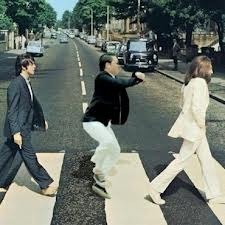Copying Gangnam Style
 Unless you’ve been living under a rock, the Gangnam Style video, and even song, is pretty much inescapable now. But if you haven’t seen it, you can add to the almost 450 million views already in existence by watching here. But maybe you prefer one of the dozens of Gangnam Style parodies now circulating. Of course, Gangnam Style itself is sort of a parody (merged with satire) of mainstream K Pop songs and contemporary Korean life, which raises the question of whether you can parody a parody.
Unless you’ve been living under a rock, the Gangnam Style video, and even song, is pretty much inescapable now. But if you haven’t seen it, you can add to the almost 450 million views already in existence by watching here. But maybe you prefer one of the dozens of Gangnam Style parodies now circulating. Of course, Gangnam Style itself is sort of a parody (merged with satire) of mainstream K Pop songs and contemporary Korean life, which raises the question of whether you can parody a parody.
In any event, this is a blog about copying and IP. And a big question is, are these Gangnam style follow on videos legal? Luckily, Forbes is on the case with a post about this very issue:
Some commentators attribute the video’s success in part to the many parodies spawned by Psy’s original. Hundreds of remakes have been created, starring, among others: dancing babies, ponies, Batman, Gandalf, Navy midshipmen and a group of now-infamous lifeguards in El Monte, Calif.
Under the copyright law of most countries, public use of someone else’s creative work without the owner’s permission generally constitutes an infringement of the owner’s rights. You may be surprised to know, for example, that the song “Happy Birthday to You” is actually copyrighted and a license is required for all public uses of it.
As the Forbes post goes to note, musical parodies are one of the few (relatively) clear areas of fair use in copyright, since a leading case on fair use involved a musical parody–the version of Roy Orbison’s “Pretty Woman” recorded by 2 Live Crew in 1989, which spawned a dispute that went up to the Supreme Court. The key to that decision was that the 2 Live Crew version transformed the original song.This, the Forbes post notes, is not necessarily the situation here, with the Gangnam style videos:
The Court was careful to note the difference between a parody, which is usually fair use, and a satire, which is generally not fair use. A parody is a work that imitates the characteristic style of another artist or his work for comic effect or ridicule. Many of the video remakes of Gangnam Style are true parodies in that they poke fun at the Gangnam Style video and song, such as the ones that change the lyrics to “Oppa Klingon style” or “I got no style” or the ones that creatively mimic Psy’s original scenes in a comical way.
On the other hand, many of the remakes are not actually true parodies. A bunch of Navy guys dancing to the original Gangnam Style song does not poke fun at the song or the video (the song and the video have separate copyright protection). They are using the original song for the value of the song itself, rather than transforming it in such a way as to jab at it. These remakes may be funny simply because the guys can’t dance, but they are not parodies.
In contrast, satire is a work that criticizes some kind of societal vice or folly through irony, derision, or wit. Satire might borrow another work to make its social criticism, but the point of the satire is not to make fun of the work it borrows. For example, the Gangnam Style song itself is satire – it is a humorous and ironic commentary on upper-class lifestyle, specifically the lifestyle of those living in the ultra-wealthy Gangnam district of Seoul, Korea.
So far, no litigation, and Psy is making a lot of money, from appearances in Vegas nightclubs to (we guess) better recording deals. So maybe we will not pursue those–like the infamous El Monte, CA lifeguards–who copy his song (or dance) for fun and fame. But the legal basis for these copies is not that great, and this points out one of the chief problems with our current copyright system–it can really inhibit follow-on forms of creativity and put a lot of power into the hands of copyright holders. Of course, some see this as a feature, not a bug.



